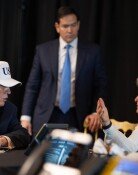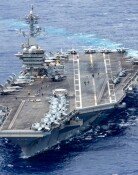[Editorial] Anti-U.S. Rallies Hurting Korea`s Interests
[Editorial] Anti-U.S. Rallies Hurting Korea`s Interests
Posted August. 04, 2008 03:09,
U.S. President George W. Bush will arrive in Seoul Tuesday on his third visit to Korea. He will also hold his third summit with President Lee Myung-bak. Bush, whose term ends in about five months, has mounting issues to tackle on bilateral relations between the two countries. Needless to say, his visit this time holds huge importance.
Ties between the two countries received a big boost after Bush made the U.S. Board for Geographic Names restore its description of the Dokdo islets from undesignated sovereignty to Korean territory. On this, Japan downplayed the change, saying it was a mere makeshift measure for Bushs upcoming visit to Korea. Tokyo also says it is considering requesting that Dokdos designation return to undesignated sovereignty. Given the situation, we hope Bush will make a statement further backing Korean sovereignty over the disputed islets.
The U.S. leader has repeatedly promised to win congressional endorsement of the free trade agreement with Korea before leaving office. If the deal is not ratified within his term and a protectionist president is elected, all the hard work the two countries have put over the past several years will have been in vain. The trade talks might then have to start from scratch again. Other agenda items should be discussed by the two leaders heart-to-heart, such as their bilateral alliance and North Koreas nuclear program.
In line with Bushs visit, the People`s Association for Measures against Mad Cow Disease is planning to hold its 90th candlelight rally tomorrow. Bush has encountered protests from anti-Iraq war groups while abroad, but has yet to encounter rallies by anti-U.S. beef groups. It will be embarrassing to see global media cover the intensification of three-month-long protests during Bushs visit to Seoul by those blasting U.S. beef, which is eaten by people in more than 90 countries.
The association should consider the opposition situation. How would Koreans feel if Americans held a large demonstration in Washington during a visit by the Korean president? This is no longer a mere candlelight protest, but a matter of Koreas interests and reputation. Who will benefit from disrupting the Korea-U.S. summit, which will affect sensitive national issues? Unless Koreans grow mature enough to greet diplomatic guests in a polite manner and sensibly raise their voices on issues, Korea cannot join the ranks of advanced counties.







